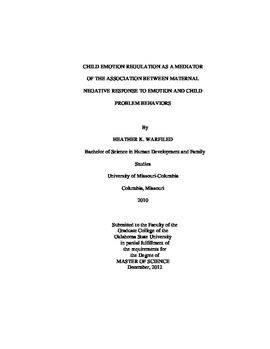| dc.contributor.author | Warfield, Heather Kristine | |
| dc.date.accessioned | 2014-04-15T21:51:25Z | |
| dc.date.available | 2014-04-15T21:51:25Z | |
| dc.date.issued | 2012-12-01 | |
| dc.identifier.uri | https://hdl.handle.net/11244/9144 | |
| dc.description.abstract | Previous research supports a link between negative parent responses to emotion expression and poor emotion regulation in children. Additionally, previous research has demonstrated a link between child internalizing and externalizing behaviors and parent negative responses to child emotion as well as poor child emotion regulation. The purpose of the present study was to investigate whether child emotion regulation mediates the relation between mothers' negative response to child emotion expression and child internalizing and externalizing behaviors, a relation not yet examined in prior studies. Two hundred and eight 1st graders (53% female) were followed longitudinally through 2nd grade. During children's first grade year mothers (81.6% Caucasian, 14% Native American, and 4.4% Other) completed the Coping with Child Negative Emotion Scale (CCNES). During children's 2nd grade year they were interviewed at their school using the Child Emotion Management Scale (CEMS) - Anger and Worry, their mothers completed the CEMS and Child Behavior Questionnaire (CBQ), and teachers and mothers completed the Behavior Assessment System for Children, Second Edition (BASC-II). As hypothesized child emotion regulation (parent but not child report) was found to mediate the relation between mothers' negative response to their children's emotions and both child internalizing and externalizing behaviors (mother but not teacher report). Specifically, poor child anger coping and worry coping were found to mediate the relation between maternal punishing of emotions and child internalizing and externalizing behaviors. Child anger dysregulation and effortful control mediated the relation between maternal punishing and child externalizing. Child worry dysregulation and poor anger coping mediated the relation between parent distress response to child emotions and child internalizing. Based on these findings, promoting positive parent response to child emotions and fostering child emotion regulation abilities in prevention and intervention programs may be important in reducing likelihood of child internalizing and externalizing behavior problems. | |
| dc.format | application/pdf | |
| dc.language | en_US | |
| dc.publisher | Oklahoma State University | |
| dc.rights | Copyright is held by the author who has granted the Oklahoma State University Library the non-exclusive right to share this material in its institutional repository. Contact Digital Library Services at lib-dls@okstate.edu or 405-744-9161 for the permission policy on the use, reproduction or distribution of this material. | |
| dc.title | Child Emotion Regulation as a Mediator of the Association Between Maternal Negative Response to Emotion and Child Problem Behaviors | |
| dc.type | text | |
| osu.filename | Warfield_okstate_0664M_12564.pdf | |
| osu.college | Human Environmental Sciences | |
| osu.accesstype | Open Access | |
| dc.description.department | Department of Human Development and Family Science | |
| dc.type.genre | Thesis | |
| dc.subject.keywords | emotion regulation | |
| dc.subject.keywords | externalizing | |
| dc.subject.keywords | internalizing | |
| dc.subject.keywords | maternal negative response | |
